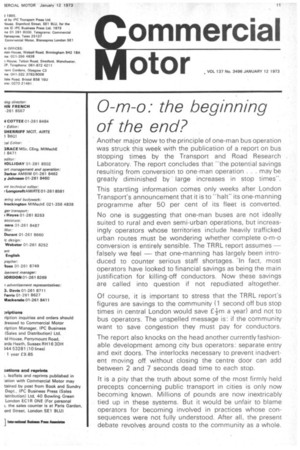0-m-o: the beginning of the end?
Page 13

If you've noticed an error in this article please click here to report it so we can fix it.
Another major blow to the principle of one-man bus operation was struck this week with the publication of a report on bus stopping times by the Transport and Road Research Laboratory. The report concludes that "the potential savings resulting from conversion to one-man operation . . . may be greatly diminished by large increases in stop times".
This startling information comes only weeks after London Transport's announcement that it is to "halt" its one-manning programme after 50 per cent of its fleet is converted.
No one is suggesting that one-man buses are not ideally suited to rural and even semi-urban operations, but increasingly operators whose territories include heavily trafficked urban routes must be wondering whether complete o-m-o conversion is entirely sensible. The TRRL report assumes falsely we feel — that one-manning has largely been introduced to counter serious staff shortages. 'In fact, most operators have looked to financial savings as being the main justification for killing-off conductors. Now these savings are called into question if not repudiated altogether.
Of course, it is important to stress that the TRRL report's figures are savings to the community (1 second off bus stop times in central London would save Eim.a year) and not to bus operators. The unspelled message is: if the community want to save congestion they must pay for conductors.
The report also knocks on the head another currently fashionable development among city bus operators: separate entry and exit doors. The interlocks necessary to prevent inadvertent moving off without closing the centre door can add between 2 and 7 seconds dead time to each stop.
It is a pity that the truth about some of the most firmly held precepts concerning public transport in cities is only now becoming known. Millions of pounds are now inextricably tied up in these systems. But it would be unfair to blame operators for becoming involved in practices whose consequences were not fully understood. After all, the present debate revolves around costs to the community as a whole.








































































































